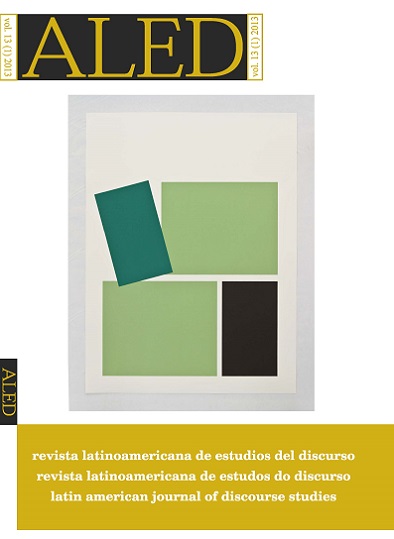Paradigmas en disputa, presupuestos compartidos
Keywords:
sexuality. repression. social representations. ideological sign. dominant discourse. parliamentary debate.Abstract
This paper analyzes the representations about sexuality that emerged in the parliamentary debate regarding the Sexual Education Bill on August 16th, 2006, in Argentina. The method is based on Critical Linguistics (Hodge and Kress, 1979), which postulates that every dialect provides its speakers with models to classify and interpret the events of the world. The aim of this article is to find out how the Sexual Education Bill is supported by a discourse which questions the referential focus imposed by the dominant discourse (Raiter, 1999a). This discourse marks the ideological sign “sexuality” with repressive values, either as immoral, associated with sin, or the stigmatization of certain sexual practices, or fear of contracting certain diseases, abuse, or unplanned pregnancy. We specifically focus our analysis on the interventions of two Members of Congress, one in favour of the project and the other one against it. Thus, we intend to elicit the conceptions about sexuality that underlie the acceptance and rejection of sexual education and the degree in which both paradigms presuppose different values of the ideological sign “sexuality”.
Downloads
References
ARIÉS, P. [1982] (1987). Sexualidades occidentales. Buenos Aires: Paidós.
DUCROT, O. [1984] (2001). El decir y lo dicho. Buenos Aires: Edicial.
FAUR, E. (2012). El desafío de la educación sexual. La Plata: UNIPE.
FOUCAULT, M. [1976] (2001). Historia de la sexualidad. La voluntad del saber. Argentina: Siglo XXI.
FREUD, S. [1929] (2000). El malestar en la cultura. Madrid: Amorrortu Editores.
GARCÃA NEGRONI, M. M. (2001). La enunciación en la lengua. Madrid: Gredos.
GIDDENS, A. [1992] (1998). La transformación de la intimidad. Buenos Aires: Cátedra.
GIVÓN, T. (1979). On understanding grammar. Nueva York: Academic Press.
HALLIDAY, M. A. K. (1985). Introduction to functional grammar. Londres: Edward Arnold.
HODGE, R. y KRESS, G. (1979). Language as ideology. Londres: Routledge.
KERBRAT-ORECCHIONI, C. (1986). La enunciación de la subjetividad en la lengua. Buenos Aires: Hachette. LAVANDERA, B. (1986). Decir y aludir: una propuesta metodológica, Filología, 20(2):21-31.
MARCOVECCHIO, A. M., LIEBERMAN, D. I. y TROMBETTA, A. M. (2006), Valores sintácticos y semánticos de las construcciones pronominales. Buenos Aires: Universidad de Buenos Aires, Facultad de Filosofía y Letras.
PÊCHEUX, M. [1975] (2010). Semantica e discurso. Campinas: Editora Unicamp.
PÉREZ, S. (1999). Voces en el Parlamento, en A. Raiter (comp.) Discurso y ciencia social, pp. 117-134. Buenos Aires: Eudeba.
RAITER, A. (1999a). Mensaje, presuposición e ideología, en A. Raiter (comp.) Discurso y ciencia social, pp. 39-50. Buenos Aires: Eudeba. RAITER, A. (1999b). Lingüística y política. Buenos Aires: Biblos.
RAITER, A. (2009). “Hablo y entiendan”: creencias, presuposición e interdiscurso en los actos de Cristina Fernández de Kirchner’, Oralia, 12: 73-96.
TREW, T. [1979] (1983). Lo que dicen los periódicos, variación lingüística y diferencia ideológica, en R. Fowler (comp.) Lenguaje y control, pp. 159-211. México: Fondo de Cultura Económica.
VERÓN, E. [1986] (1993). La semiosis social. Fragmentos de una teoría de la discursividad. Barcelona: Gedisa.
VERÓN, E. (1987). La palabra adversativa, en E. Verón (comp.) El discurso político. Lenguaje y acontecimientos, pp. 13-26. Buenos Aires: Hachette.
VOLOSHINOV, V. [1929] (2009). El marxismo y la filosofía del lenguaje. Argentina: Godot.
WAINERMAN, C., M. DI VIRGILIO y N. CHAMI (2008), La escuela y la educación sexual. Buenos Aires: Manantial.
Downloads
Published
How to Cite
Issue
Section
License

This work is licensed under a Creative Commons Attribution-NonCommercial-NoDerivatives 4.0 International License.
The authors retain the copyright and guarantee RALED the right to be the first publication of the work as well as a Creative Commons Attribution License that allows others to share the work with recognition of authorship and the initial publication in this journal.




